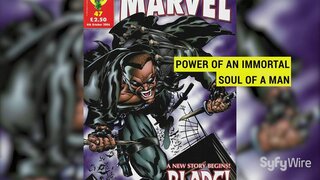Create a free profile to get unlimited access to exclusive videos, sweepstakes, and more!
Why the Original Blade Movie Still Works, 25 Years Later
Looking back at a comic book movie classic, and why we still love it.
One of the first things you see in Blade (now streaming on SYFY's Movies hub), Stephen Norrington's 1998 adaptation of the Marvel Comics character of the same name, is a nightclub where it rains blood.
It's been 25 years, and the vampire rave sequence, rain of blood and all, remains one of the most captivating in a comic book movie landscape that has now grown to encompass numerous billion-dollar movies, two-part epics, and entire universes that promise bigger and bigger storytelling with each new chapter. But it's not just the flashy visual that compels us to keep going back. Over the last quarter-century, the comic book movie world has shifted dramatically, but Blade still stands tall, even as Marvel Studios seeks to reboot the character with a new actor and a new story that will fit right into the company's shared universe.
Why we still love Blade
So, what about it keeps us coming back? Why does Blade still stand as one of the most entertaining films of its kind after 25 years and dozens of movies that have sought to follow it into superhero cinema glory?
RELATED: From Blade to Hellboy, 8 Scary Comic Book Movies You Should Watch
From the beginning, it's clear that Blade is walking a fine line, much like the title character's "daywalker" nature as a human/vampire hybrid. There are, of course, elements of the Marvel Comics source material scattered throughout the film, and it's very clear we're dealing with a comic book world, a heightened reality where weapons, monsters, and heroes behave in ways that more grounded films might not allow.
But while the comic book-ness of Blade is never in doubt, the film also took plenty of liberties. Wesley Snipes' title character looks and acts very differently from his comics counterpart, a character who didn't have the "daywalker" biology in his original incarnation. A lot of this is just to add a certain cinematic value for the late 1990s, giving Blade sunglasses and trench coat to match the vibe of action cinema at the time. His more vampiric abilities are also a key part of the effort to up the cinematic thrills, delivering a hero who can be as fast, as strong, and as monstrous as the villains he's chasing.
Speaking of monstrous, there's the film's R-rating, something certain comic book movie fans have come to champion in recent years as a kind of secret key to unlocking certain characters on the big screen. Blade luxuriates in its ability to curse, to dismember, to bleed at will, to be sure, but it's not just that the film is eager to dump buckets of gore on its audience. The R-rating is, instead, in service of a larger tonal balance, one struck through the action, the cinematography, and of course through Snipes' core performance. His skill, his swagger, and his sheer devotion to disappearing behind the wardrobe means that Blade emerges as a standalone character, but we also never forget we're watching a bona fide action star at work. The R-rating unleashes Snipes' performance, but it's not just the extremity of the content that makes him feel so vibrant, so fun to watch. It's the way the character works as part of a larger whole.
RELATED: Blade's Mahershala Ali on Black representation in superhero movies: 'You just weren’t seeing anyone'
Which brings us to what I think is the real secret of Blade's success, the reason the movie still works and still captivates audiences after 25 years of comic book movie expansion and flat-out dominance. Right now, we're living in an era for the genre when we have to ask, whether we want to or not, how everything relates to everything else. Can you watch The Flash if you know nothing about the DCEU? Will Ant-Man 3 make sense to you if you've never seen Loki? Will the next Avengers movies actually work with the same sense of magic and power that the previous ones did now that we know to expect years of intervening stories? These are questions the films and shows demand we ask, and they offer a variety of answers.
Then there's Blade, a film that offers none of those questions, yet still feels like it exists as part of a larger world. Blade doesn't work because it abandoned its comic book roots, nor does it work because it embraced them completely. It works because, like Blade himself, it's a film that delights in walking in two worlds. There is, simultaneously, a sense of celebrating comic book movies and of departing from them. That makes it a singular achievement, and a film uniquely suited to captivating us even now.






























